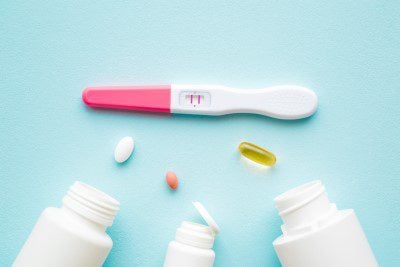Fads tend to come and go. Yet, the coenzyme Q10 and fertility trend hasn’t faded quite yet. So, is it just a fad? Can it actually help with fertility?
In this blog, we’re going to examine what coenzyme Q10 is, its impact on male and female fertility, how it works, side effects, and more. Let’s take a look.
What is CoQ10?
Coenzyme Q10, also referred to as CoQ10, actually occurs naturally in the human body. Technically, it’s an antioxidant. Antioxidants are well-known substances created by the body and consumed via the food we eat. These substances prevent and slow the damage to the body’s cells caused by free radicals. Free radicals can cause oxidative stress, which can in turn overwhelm the body’s regular functions.
The interesting side of CoQ10 is that it’s stored in the part of the cell called the mitochondria. The mitochondria act as the powerhouses of the cells, which means they produce energy and this drives all functions within your body.
Generally, CoQ10 is used within the body for growth and protection of the cells. It further plays an important role in metabolism. In fact, without CoQ10, your body is unable to produce energy.
Undeniably, it’s important. We’ve answered the question, “What does CoQ10 do,” but what about CoQ10 in relation to fertility?
CoQ10 and Fertility
Studies show that as you age, you experience a decrease in your CoQ10 levels. This correlates with the natural decline in fertility that occurs after the age of 30. Below, we explore the CoQ10 fertility benefits in relation to egg quality and male fertility.
CoQ10 and Egg Quality
There are a few CoQ10 benefits for women. Since CoQ10 plays a major role in energy production, as CoQ10 decreases in the body, a woman’s eggs become less efficient at creating energy. While many factors come into play with infertility, this lower energy production may contribute to a lower egg quality, as well as an increased risk of embryo loss. Thus, increased CoQ10 may improve egg quality and the ability to carry a pregnancy to full-term.
CoQ10 and Male Fertility
There’s some evidence indicating that CoQ10 may improve sperm motility. In fact, research indicates that sperm motility and sperm concentration improved with CoQ10 treatment options. It’s further been theorized that CoQ10 might help protect against free radicals which can impair sperm and inhibit motility. This is why sometimes CoQ10 supplementation is recommended or considered for male infertility.
CoQ10 Supplements
Since age is significantly correlated with lower CoQ10 levels, it may be worthwhile to consider taking CoQ10 supplementation as part of your fertility plan. However, it’s always best to discuss your options with your fertility team to determine whether or not they recommend this for your specific situation.
Ubiquinol vs Ubiquinone
Ubiquinol and ubiquinone are both types of CoQ10 supplementation. In fact, these two terms are often used interchangeably. Yet, there is a difference between the two.
Ubiquinol is technically a reduced form of CoQ10. This simply means that ubiquinol has less electrons than ubiquinone. Meanwhile, ubiquinone is the oxidized form of CoQ10. Within the body, CoQ10 actually shifts between these two types. This means that no matter which one you choose, your body will naturally convert it to the form it needs.
Up until around 2007, CoQ10 was only available in the form of ubiquinone. However, there is no evidence showing that one is superior to the others, especially since the body is able to convert it to one or the other.
Does CoQ10 Work?
As previously mentioned, there are many layers to infertility. This often means that one supplement is unlikely going to solve these issues. However, it may help!
Originally, CoQ10 was supplemented to help with cardiovascular conditions. Research indicates that it can help with high blood pressure and even congestive heart failure. Studies further show that it may help with neurological diseases, like Parkinson’s and Huntington’s Disease.
Yet, what about the research on CoQ10 and fertility? What does the evidence have to say?
CoQ10 Fertility Research
In women with a poor ovarian reserve, CoQ10 supplements improved ovarian response to stimulation and some embryological parameters.
Other studies have also shown when supplemented, CoQ10 may help balance out oocyte (immature egg) deficits leading to infertility.
Researchers also explored CoQ10 supplementation in regards to pregnancy rates and quality embryos. CoQ10 may improve these numbers, as well as potentially improve IVF outcomes.
As previously mentioned, research further shows that CoQ10 supplements may improve sperm count and motility, improving fertility in men as well.
Are CoQ10 Supplements Safe?
CoQ10 supplements are considered safe. However, some individuals that should talk to their doctor before taking them since risks can be involved include those with chronic diseases such as heart failure, kidney disease, liver problems, and diabetes.
While there isn’t an exact recommended dosage of CoQ10, a typical daily dosage frequently includes 100 to 200 milligrams. As with any supplement or medication, it’s important to follow the directions on the label and to be mindful of any other ingredients included.
Coq10 Supplement Side Effects
CoQ10 supplement side effects may include diarrhea, heartburn, and nausea. However, these are very rare.
Additionally, individuals taking blood thinners and thyroid medications should discuss their options with their doctor before taking CoQ10 supplements.
At ELITE IVF, we find so much joy in helping individuals and couples make their baby dreams come true. We are here to help you create the family you’ve always wanted. If you have any questions regarding fertility procedures or recommendations, reach out to us today or fill out our online form to schedule your free phone consultation.


